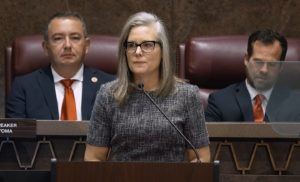Arizona Board of Education rejects proposed restrictions on ESA program
The Arizona state school board rejected proposed updates to the state’s universal school choice program, which would have restricted parents’ freedoms.
During its annual review of the ESA…

The Arizona state school board rejected proposed updates to the state’s universal school choice program, which would have restricted parents’ freedoms.
During its annual review of the ESA Parent Handbook, the Arizona Board of Education heard recommended updates from John Ward, the program’s executive director.
Ward suggested four significant updates for the 2024-25 handbook:
- Prevent ESAs from being used solely in the summer;
- Prevent private schools from being the “custodian” of an ESA;
- Require students with disabilities to submit an annual “Education Plan” after 12th grade;
- Restrict what items can be purchased with an ESA by redefining a “reasonable expense.”
But Board Member Jennifer Clark objected to proposed changes on two counts.
In a letter to her fellow board members, Clark explained that while the ESA program is reviewed annually, state policy dictates “substantive changes to the handbook shall be limited to once every three years.”
“Presumably, this policy is to maintain some consistency for parents,” she continued. “We approved a handbook with substantive changes last year; therefore, substantive changes should not be made this year.”
Clark also objected to the redefinition of “reasonable expense,” arguing it was too limiting.
“The Legislature has established the approved categories that are allowable with ESA funds and has chosen NOT to put dollar amount restrictions on these items,” the letter read. “Nor has the Legislature empowered the department to put dollar amount restrictions or to exclude items ‘at the highest end of the price range.’”
During its meeting on Monday, the board voted 9-1 against the proposed updates.
Anna Tovar, the sole dissenter, suggested parents might be using the ESA funds irresponsibly.
“There have to be accountability measures and making sure that taxpayer money is being spent wisely,” Tovar said, according to local media. “There might be […] bad actors out there in regards to using public funds in the wrong way.”
However, ESA parents were glad the changes got shot down.
“The proposed handbook appears to usurp the freedom of the parents and the authority of the lawmakers who put the law into effect,” said parent Becky Greene. “I’m concerned this is a lack of transparency that cooperates more with those who aren’t invested in the program or its success.”
Another mother, Bonita Scales Jenkins, said her family would suffer from increased restrictions, since her daughter needs expensive shoes for ballet and other students might require high-end instruments to excel in their disciplines.
Advocates of the ESA program also expressed concerns about the lack of time given for community input on the proposed changes before the board’s vote.



